Christian Movies Started Terrible, But Can Improve Like Any Other Genre
I’ve a brilliant idea: let’s go on the internet and write an article—yes!—an article about why Christian movies are terrible.
It’ll be a scathing criticism for evangelicals everywhere!
First, here’s my disclaimer. (This is per article 11, section 81b of the Charter of Young Christian Popular Culture Web Writing.) I certainly agree that plenty of Christian movies are cheesy and doctrinally shallow. Equally worse, they’re often stunted in their thematic content. My pedigree is fairly established on this topic.1
But increasingly, such “hot takes,” which list all the reasons Christian movies suck, have begun to ring repetitive. An article like Jared C. Wilson’s most recent “Why Christian Movies Are So Terrible” offers valid criticisms—if it had been written in 2013.
Why do I make this claim?
Have all Christian movies suddenly gotten amazing?
Are they taking mass audiences by storm and charming the critics?
No.
But it’s simply no longer accurate to claim Christian movies are all terrible. Here are three reasons why.
1. Some newer Christian movies are really good.

Joseph Fiennes portrays Roman tribune Clavius in Risen (2016).
My favorite recent Christian movies are Risen (2016; my review is here) and The Case for Christ (2017). Interestingly, both of these address the same theme: the resurrection of Jesus. Even better, they’re both simple yet well-made stories. Their creators do what they set out to do, albeit in two different genres. My “Cheesy Christian” detector, during each film, remained pleasantly silent.
The same is true of an older Christian movie, Amazing Grace (2006), a drama based on the abolition activism of William Wilberforce. We all seem to have just forgotten this gem. But it was well-made, solidly gospel-based, and starred Ioan Gruffudd (as Wilberforce), Albert Finney, Michael Gambon, and even the Benedict Cumberbatch.
A few other recent films have approached this goal of excellence, even if they failed to reach it.
For example, I was fond of the general direction, and a few portions, of Dallas Jenkins’s The Resurrection of Gavin Stone (2017). 2
Last year, my wife and I really enjoyed Paul, Apostle of Christ (2018). And by all accounts, last year’s I Can Only Imagine and God’s Not Dead 3 at least tried to take the contemporary-Christian genre in some new directions.
As Scott Kelly notes in his excellent article “Are Christian Movies Still Terrible?“:
While my criticisms about “Christian film” have been quite sharp and damning in the past, I have seen such improvement in this subgenre in just the last two years that I’ve been a bit shocked. I don’t think I’m getting soft on these movies, but I’m also not finding myself continually frustrated as these films release. Some of them I quite enjoy and even have in my disc collection. Some of them I’ve felt confident enough to recommend to fellow Christians, knowing there isn’t an enormous amount of bad theology, gratuitous nationalism, or juvenile artistic decisions in the work.
Did these films win mainstream critical acclaim? No. But at this point, I’m not expecting critical acclaim—not for a genre still in its infancy. (More on this below in point 3.)
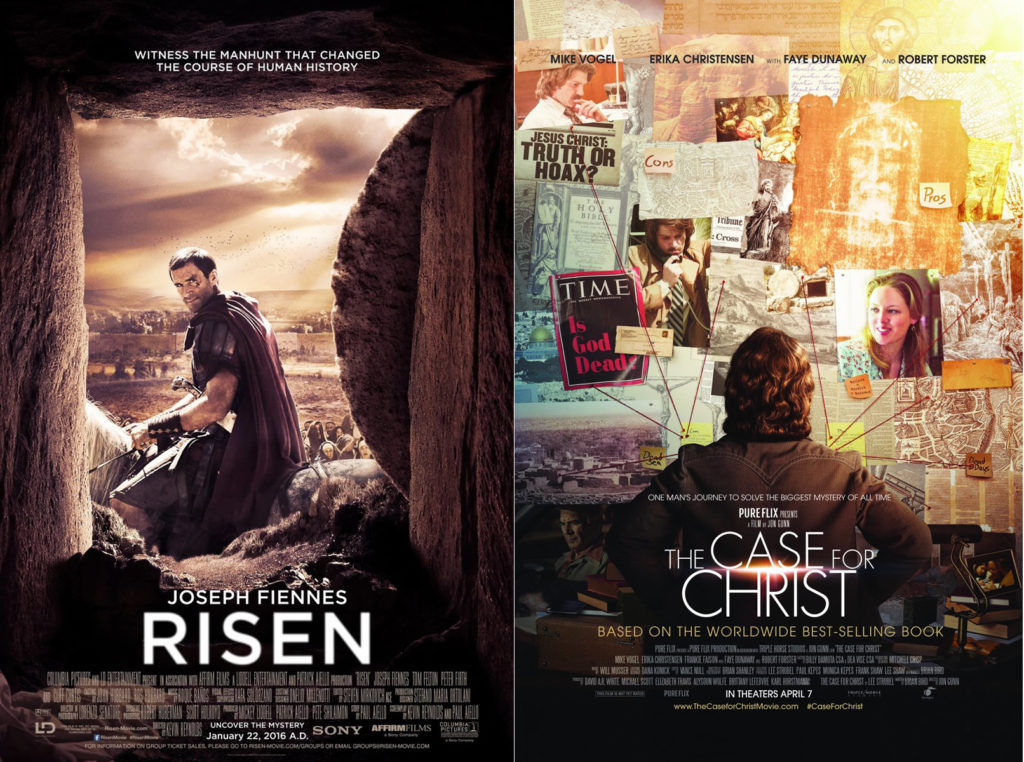
Two good Christian movies: Risen (2016) and The Case for Christ (2017)
2. Most of Christian movie-dom represents a distinct genre.
For this point, I’m limiting Christian movies to the dominant genre: stories set among contemporary churchgoers.
(In other words, we’re not talking about biblical drama, starring mainly the Bible’s central characters, or biblical fiction like Risen.)
Christian movie reviewer Tyler Smith believes this genre is distinct and classifiable. He calls it “Christian social drama.” That’s as good a name as any. And so far, movie critics, Christian and otherwise, seem not to recognize that we’re dealing with an entirely distinct genre. Smith compares this to an earlier genre, like film noir. He suggests that just as these genre films started simpler, and even cheesy or pulpy, so Christian social drama movies could develop and become more complex in the future.
3. Christian social drama is still early in development.
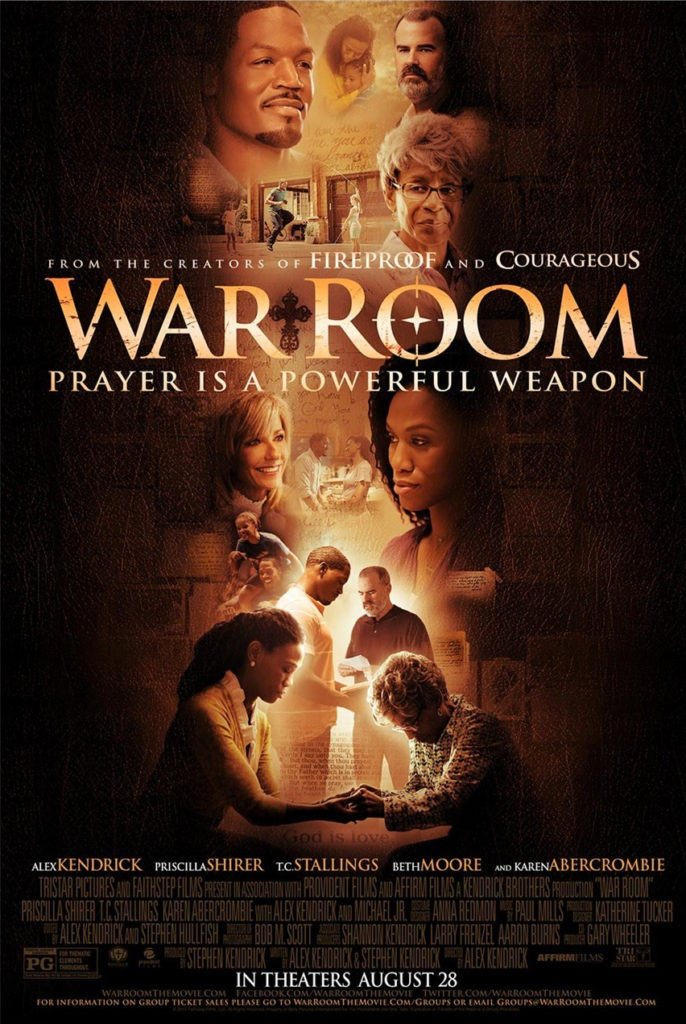 Again, let’s stick with Christian social drama as a genre. (This includes the Sherwood Pictures films, God’s Not Dead, I Can Only Imagine, and all those movies where upper-middle-class blond children are miraculously healed.)
Again, let’s stick with Christian social drama as a genre. (This includes the Sherwood Pictures films, God’s Not Dead, I Can Only Imagine, and all those movies where upper-middle-class blond children are miraculously healed.)
Sometime later I may expand on this short simile. Compare today’s Christian social drama movies with early superhero black-and-white movie serials. This may illustrate just how early genres, popular and otherwise, start off ridiculous. Then, as new creators who’ve grown up to appreciate yet critique these movies arrive on the scene, the genre gets more complex. New creators take what’s basic about the genre, then challenge it with new stories.
Of course, a creator does this best if he or she wisely respects and shows affection for the simpler genre stories that have come before.
Also of course: one could argue that most of today’s cinematic superhero stories haven’t really matured.3
But the point is that today’s Marvel/DC/any superhero films are worlds better than their early 1940s attempts, according to this genre’s own rules and expectations.
Similarly, imagine the Christian social drama films of the 2040s. What maturity could they show, if they’re being made by competent, joy-driven, and well-funded creators who grew up learning to appreciate even the “cheese” of their genre’s earlier generation?
We may need to wait a few decades to find out. But until then, let’s stop being so insular, over-sheltered, and real-world-naive about our criticisms.
Let’s do like we do with any Christian: praise the good, and gently critique and correct the bad.
Above all, let’s make sure we’re loving our neighbors who like these kinds of movies. And let’s especially be sure that we rise to meet our own standard. Sure, it’s reasonable to insist that Christian movies reflect the real world. But if so, let’s make sure that we first practice living in the real world, in which real people stubbornly insist on liking all these sentimentalist, cheesy Christian movies.
Next (Friday, Jan. 11), a sequel: do Christian creators know when their movies are bad?
- See last spring’s Four Biblical Critiques of Christian Movies, 2015’s Christian Movies Can Show Better Sermons, and my regretfully snarky 2014 review of Left Behind movie 2.0 starring Nicolas Cage. A related critique is that many movies marketed as “Christian” are not really very Christian at all. Much of the time, they’re simplistically Churchian, a popular but arguably spinoff religion. That’s why I can reluctantly disagree with, say, my friend Mike Duran when he challenges the label of “Christian fiction.” ↩
- The ultimately predictable church-set dramedy starred Marvel’s Agents of S.H.I.E.L.D.‘s Brett Dalton. See my review at Christianity Today‘s website. ↩
- Or, if certain directors try to subvert both the “ha ha fun for kids” and “grimdark and nihilistic for grown-ups” superhero genre expectations, they get maligned and slandered. ↩





















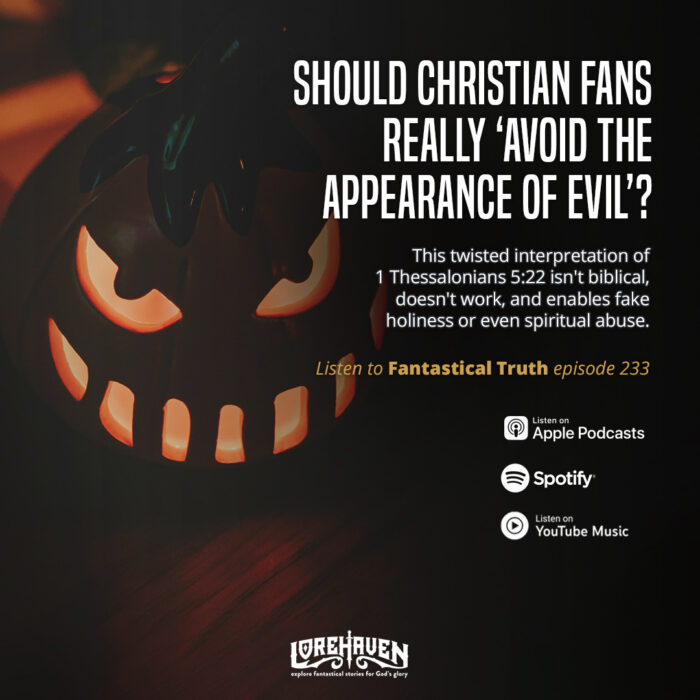




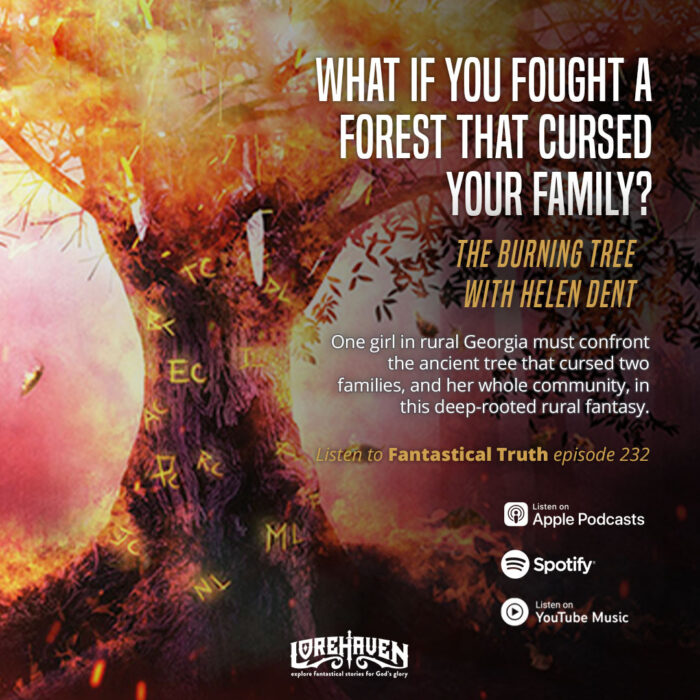




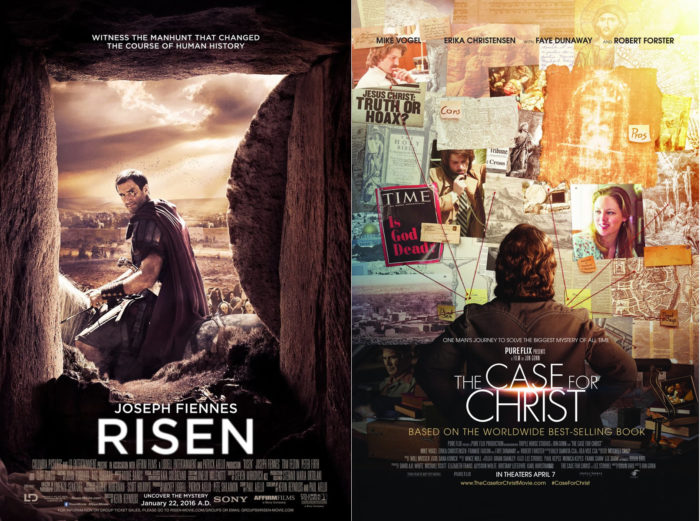




[…] can think of quite a few Christian movies that were so bad I couldn’t finish. In this article, E. Stephen Burnett talks about some Christian movies that are bucking the “terrible […]
[…] Christian Movies Started Terrible, But Can Improve Like Any Other Genre | E. Stephen Burnett, Jan 10 […]
[…] Christian Movies Started Terrible, But Can Improve Like Any Other Genre | E. Stephen Burnett, Jan 10 […]
[…] Christian Movies Started Terrible, But Can Improve Like Any Other Genre, this website, Jan 10, 2019 (immediately preceding the article to which Murphy responds) […]